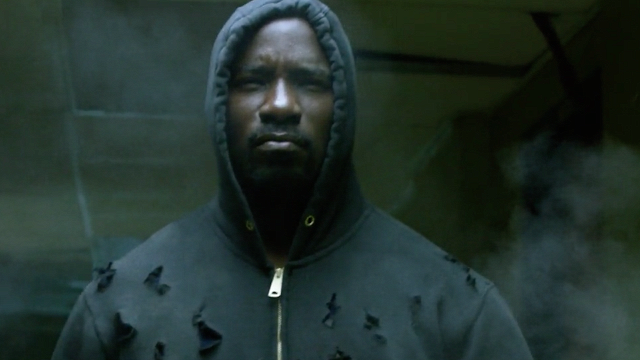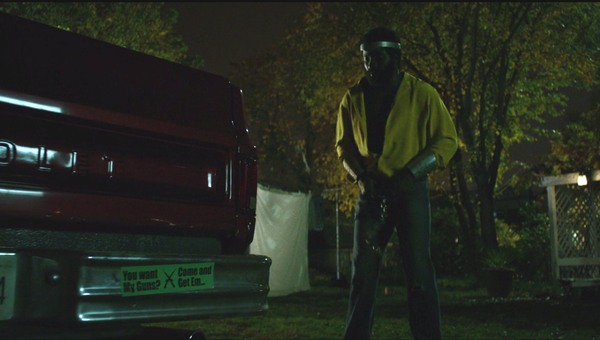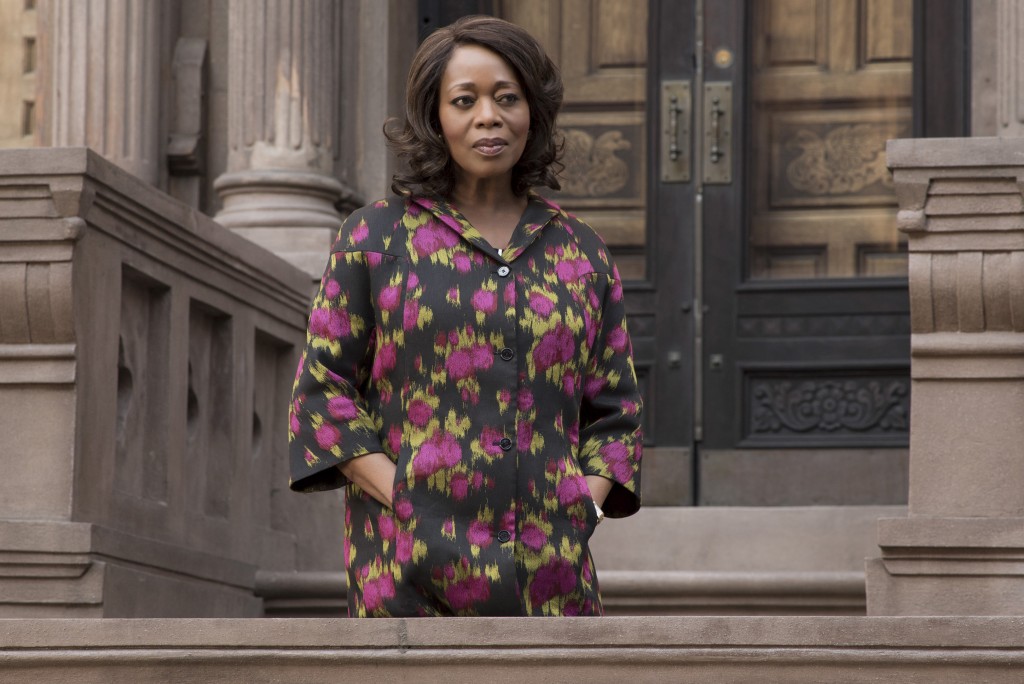Already a breakout character from Jessica Jones, the release of Marvel’s Luke Cage last week marked the cementing of the iconic superhero in the mainstream media consciousness. We’re still a ways out from Ryan Coogler’s Black Panther film bringing Wakanda to the big screen, so for now, Luke Cage is the great hope for a Black America desperate for someone to root for. For the first time since the inception of the MCU, Marvel has presented a pure, diverse vision within their accepted house style. But the trade off for that level of idiosyncratic storytelling comes in the form of a noticeable drop off in overall quality. That’s not to say Cage is a failure. Far from it. The 13-episode first season represents an anomaly among Marvel live action projects for as many good reasons as bad.
On the positive side, there’s something undeniably rapturous about getting to watch a long-form superhero project created by and largely starring artists of color. Blackness permeates Cage in an engrossing, inspirational way. The series boasts a deep cast of incredible black performers, each portraying an array of characters. Harlem, the primary setting for the show, is depicted symbolically, here representing the capital of black culture. Everyone Luke comes into contact with is an authority on historical figures, sports and music, making every interaction the platonic ideal of a barbershop talk.
Barbershops! This is a Marvel show where the hero spends most of the series trying to fix up a barbershop because it represents a neutral zone in this otherwise tumultuous community. People on both sides of the “classic or trash” fence for this show can agree that it wears its blackness with palpable pride. Black Dynamite composer Adrian Younge and Ali Shaheed Muhammad from A Tribe Called Quest tether everything together with what is easily the best score any MCU project has ever possessed. It crackles and soothes with Blaxploitation swagger and soulful meditation. It’s a slick package characterized by an enduring love for black music and culture.
Much of this can be attributed to the guiding hand of showrunner Cheo Hodari Coker, the screenwriter behind the Biggie biopic Notorious. Moreso than any other chief scribe in the MCU pantheon (bar Joss Whedon), Coker has been given the opportunity to mold his particular slice of this shared universe in an image more indicative of his own personal style. But his authorial voice is a double edged sword. All the inherent credibility his individual slant brings to the project is unfortunately counterbalanced by some truly clunky writing. It’s a confounding struggle, being forced to reconcile the gift of Coker’s taste coloring Luke’s world with the curse of some awful dialogue.
Simply put, Cage is a show where Raphael Saddiq appears for a diegetic needle drop musical number (yay!) but then the viewer is forced to listen to characters awkwardly defend his solo record Stone Rollin (ugh).
That marble mouthed obsession with shoehorned pop culture references becomes more frustrating as the series progresses. At first, it feels like a mood setting tactic. An opportunity for the show to wear its influences on its sleeve and assert its rightful place in the lineage of black pulp fiction. In some scenes, it even feels novel. Hearing Luke debate the merits of Chester Himes and Donald Goines has a certain charm to it, but every time a supporting character name checks an album they adore or an athlete they admire, they start to sound like your uncle desperately clutching at a long since past relevance.
That old head adherence to nostalgia is the show’s biggest hindrance. This is a series that, given the current social climate, has the potential to really capture the zeitgeist, but instead seems content to regurgitate respectability politics. Everyone from Luke himself to Frankie Faison’s mentor character Pop (a sort of Barbershop Uncle Ben figure) seems to long for a bygone era in black culture, heavily implying a singular definition of blackness that just doesn’t jibe with 2016. The latent fetishism for wearing suits, the distaste for the word “nigga” and a litany of other talking points make Luke feel every ounce the out of touch authoritarian Bill Cosby personified for decades before we all found out he was a prolific rapist.
On a personal level, I live in a world where the color of my skin could get me unceremoniously shot, so the idea of a bulletproof black man strong enough to defend those who need protection appeals to me greatly. But you’ll excuse me if I’m not in any way interested in having that same hero suggest that black men should pull up their pants and have some respect themselves, as though respecting yourself were some impenetrable fortress from which systemic, weaponized racism might be effectively shielded. This is especially offensive given that Luke spends the entirety of the show still being wrongfully targeted despite being the embodiment of all that he espouses.
Imagine if Steve Rogers’ casually conservative values were played for anything other than laughter in the Avengers films. You’re going to tell me a white dude from the 1940s is really gonna come across as less judgmental than a black man who was falsely imprisoned and turned into a sci-fi guinea pig? Really? In the immortal words of Randy Jackson, that’s gonna be a “no” for me, dog.
Though it visually echoes the concerns of the Black Lives Matter movement through its occasionally striking imagery, Cage does little to capitalize or comment on these issues with any real resonance. The subtle retooling of Luke’s origin story feels like it wants to make a statement about the prison industrial complex, but it never quite coalesces into anything to write home about.
This depiction of Luke as being the worst of your uncle chastising you for listening to Young Thug becomes easier to swallow the moment you cease to focus on him as the show’s lead. Yes, the title is literally his namesake, but every arc in the show laps his own in complexity and execution. Cage suffers the same structure and pacing issues every Marvel Netflix series has been plagued by, but within that shoddy framework, there are several micro-narratives to be applauded. Mahershala Ali’s performance as Cottonmouth houses an unconventional interpretation of the villain awash in more pathos than anything Luke presents. Simone Missick, too, steals the show with her take on not-yet-robotically armed Misty Knight.
But its Alfre Woodard who gets the MVP award. She takes this threadbare Evil Oprah Winfrey shtick and turns Black Mariah into the most fascinating, haunting villain the MCU has ever seen. Her origin story’s exploration of the potentially poisonous black family dynamic is easily the plot point that rings the most true among the show’s otherwise ridiculous narrative machinations. Villains Erik LaRay Harvey as Diamondback and Theo Rossi as Shades both do stellar work relishing in the show’s heavy pulp leanings, but its only Woodard who successfully melds Cage‘s dueling devotion to pop art and sincere melodrama.
Maybe that’s the best thing about the show. The roster is so deep and varied that the real gems are all in the supporting cast, ably illustrating a wider spectrum of blackness than the tired alpha archetype Luke never quite transcends. Perhaps in the next season, Coker will find a way to hone that eccentricity in the development of his leading man.
For now, I’m grateful Marvel’s Luke Cage exists. But in my eyes, this is just a good start.
Luke Cage is streaming on Netflix.




